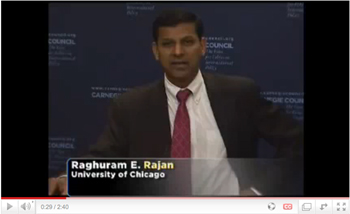| Sun | Mon | Tue | Wed | Thu | Fri | Sat |
|---|---|---|---|---|---|---|
| 1 | 2 | 3 | 4 | 5 | ||
| 6 | 7 | 8 | 9 | 10 | 11 | 12 |
| 13 | 14 | 15 | 16 | 17 | 18 | 19 |
| 20 | 21 | 22 | 23 | 24 | 25 | 26 |
| 27 | 28 | 29 | 30 | 31 |
CATEGORIES
RECENT ENTRIES
BLOG ROLL
Fractured finances
In Fault Lines, Chicago Booth’s Raghuram Rajan identifies surprising factors at the center of the economic crisis.
Chicago Booth professor Raghuram Rajan saw the financial crisis coming years ahead of time, even spoiling a 2005 celebration for Federal Reserve chairman Alan Greenspan to say so. Back then Rajan’s warnings were received with the kind of disdain reserved for someone worrying about a hangover while the champagne’s still being poured. Or worse: “I felt like an early Christian who had wandered into a convention of half-starved lions.”
Because the risks he identified registered on an economic Richter scale in 2008, Rajan’s new book Fault Lines: How Hidden Fractures Still Threaten the World Economy (Princeton University Press) carries the weight of retroactive respect. He told us so. Now reviewers from the Economist to Esquire have come to praise his perceptive view of the crisis and a still-ominous global financial future.
Rajan, the Eric J. Gleacher distinguished service professor of finance, identifies an unexpected cause of the crisis: American income inequality. As the gap increased, he argues, politicians wallpapered the problem with cheap credit. The banks that offered it and the consumers who took it were simply responding to incentives that produced untenable risks. “The worrying reality is that both are to blame,” Rajan writes, “but neither may have been fully cognizant of the fault lines guiding their actions.”
His remedies combine “free-market Chicago School economics with good-government ideas straight out of Obamaland,” Esquire’s John H. Richardson writes, including expanding access to education, extending unemployment benefits, and improving health care. Insufficient safety nets, Rajan suggests, fueled the unsustainable political and economic remedy he dubbed, “Let Them Eat Credit.” A former International Monetary Fund chief economist, Rajan also supports reforms that would allow the IMF “to play a greater role in sorting out the macroeconomic imbalances that underlay the crisis.”
Rajan does not cast victims or villains in retrospect: “To him, this was a Greek tragedy in which traders and bankers, congressmen and subprime borrowers all played their parts,” David Wessel writes in the Wall Street Journal, “until the drama reached its inevitably painful end.”
Jason Kelly
June 30, 2010

